新标准小学英语三年级起点第四册Module3 Will you take....ppt汇编
新标准小学英语(外研社三年级起)四年级下册课件M4 U1 Will you take your kite

短语,句子
• have a picnic • on Saturday • take my kite /ball • take your kite/ball • why not
• 1.On Saturday we're goin to have a picnic! • 2.Will you take your kite tomorrow? No,I won't.
Will you take your kite tomorrow?
No, I won’t.
Will you take your
ball tomorrow?
No, I won’t.
cake
take lake
take
make
take your bag to your school
take your English book in your bag
Will you play football on Monday? B: Yes, I will. / No, I won’t.
take
Will you take your … ?
Will you take a
?
Will you take your kite tomorrow?
No, I won’t.
Will you take your
ball tomorrow?
No, I won’t.
Because tomorrow is Friday.
Will you…?
Yes, I will. / No, I won’t.
Homework:
小学四年级下册新标准外研版英语三年级起点第四册全册教案
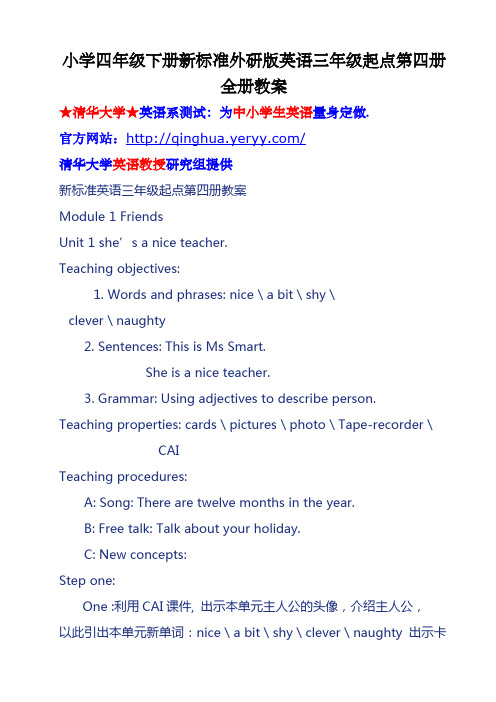
小学四年级下册新标准外研版英语三年级起点第四册全册教案★清华大学★英语系测试:为中小学生英语量身定做.官方网站:/清华大学英语教授研究组提供新标准英语三年级起点第四册教案Module 1 FriendsUnit 1 she’s a nice teacher.Teaching objectives:1. Words and phrases: nice \ a bit \ shy \clever \ naughty2. Sentences: This is Ms Smart.She is a nice teacher.3. Grammar: Using adjectives to describe person. Teaching properties: cards \ pictures \ photo \ Tape-recorder \CAITeaching procedures:A: Song: There are twelve months in the year.B: Free talk: Talk about your holiday.C: New concepts:Step one:One :利用CAI课件, 出示本单元主人公的头像,介绍主人公,以此引出本单元新单词:nice \ a bit \ shy \ clever \ naughty 出示卡片,学习新单词。
Two: Learn the new lesson.Listen to the tape .Try to read the text. Translate thesentences.Listen to the tape again, read follow the tape.Read the text, boys and girls.★哈佛大学★英语系研究,美国布什推荐。
专为中小学生英语量身定做。
官方网站:/哈佛大学英语教授研究组提供Step Two: Talk about the pictures.Close your books, show the pictures (parrot,Xiaoyong,Maomao,Ms Smart)Example :( 1) This is Parrot.Parrot is a very naughty bird.(2) This is Xiaoyong .He’s a clever pupil.Step Three: Using adjectives to describe person.利用实物投影展示学生带来的照片。
小学四年级下册新标准英语三年级起点第四册全册教案

新标准英语三年级起点第四册教案Module 1 FriendsUnit 1 she’s a nice teacher.Teaching objectives:1. Words and phrases: nice \ a bit \ shy \ clever \ naughty2. Sentences: This is Ms Smart.She is a nice teacher.3. Grammar: Using adjectives to describe person.Teaching properties: cards \ pictures \ photo \ Tape-recorder \ CAITeaching procedures:A: Song: There are twelve months in the year.B: Free talk: Talk about your holiday.C: New concepts:Step one:One :利用CAI课件, 出示本单元主人公的头像,介绍主人公,以此引出本单元新单词:nice \ a bit \ shy \ clever \ naughty 出示卡片,学习新单词;Two: Learn the new lesson.Listen to the tape .Try to read the text. Translate the sentences.Listen to the tape again, read follow the tape.Read the text, boys and girls.Step Two: Talk about the pictures.Close your books, show the pictures parrot, Xiaoyong, Maomao, Ms SmartExample : 1 This is Parrot.Parrot is a very naughty bird.2 This is Xiaoyong .He’s a clever pupil.Step Three: Using adjectives to describe person.利用实物投影展示学生带来的照片;Describe the person using the adjectives Homework: Introduce your classmates to your family.Example: This is Xiaoyong.He’s a clever pupil.Game: 接龙游戏Example: A: I’m XiaoLan. I’m a bit shy.B: XiaoLan is a bit shy. I’m ZhangYong. I’m very nayghty.C: ZhangYong is very naughty. I’m Jim, I’m a nice boy.…Designs: Module One: Friends新标准英语三年级起点第四册教案Module 1 FriendsUnit 2 He’s cool.Teaching objectives:1. Words and phrases: cool \ little \ cute.2. Sentences: This is this is my big brother, He’s cool.Teaching properties: cards \ Tape-recorder \ CAITeaching procedures:A: Song: Row Row Row your boat.B: Free talk: Using adjectives to describe the poem.C: New concepts:Step one: Warmer:Using the adjectives to describe your classmates.Example: ① This is Xiaoyong.He is a clever pupil.② This is Yuanjiaqi.She’s very clever, but she’s a bit shy.Step Two: Listen and point.1 Point out the different meanings of the word “cool”.In this unit, “cool” means fashionable, and it is most commonly used to mean “quite cold”. The word “cool” has other meanings as well, but they are ones that the students are unlikely to come across in the future.2 Listen to the tape and underline the new words. Write down these adjectives on the board, and then learn these new words.Listen to the tape again. Read the text.Close your book. Use CAI shows the pictures of text. Choose some students to describe the pictures.Step Three: Listen and say, then say the poem and do theactions.Play the spoken version of the poem. And have the students. Repeat each line. Play the tape and have the students.Step four:Tell the students that they are going to work in groupsof three or four.Do the AB unit 2.Homework:Choose some words to write about your friend.Example: This is my friend×××. She is a clever pupil. Atschool, she’s a bit shy, but at home, she is very naughty girl.Game:Explain that they are going to play a game where theyhave to whisper some information to their classmate. Thatclassmate has to whisper the information to the next person.The last person. That person has to say that he \she heard.Then, the other students listen carefully to find out if the message has changed at all. Designs:Unit 2 He’s cool.mother --- nicebig brother --- coollittle sister --- cutefather --- cleverfriend --- naughty新标准英语三年级起点第四册教案Module 2 LondonUnit 1 London is the capital of England.Teaching objectives:1、Words and phrases:capital, about, beautiful,be from2、Sentences:I’m from London.London is the capital of England.It’s very big and very beautiful.3、Grammar: the present tenseTeaching properties: cards, pictures, tape—recorderTeaching procedures:A: Chant: This is a little girl, and she has a little curl. And when she is good, she is very, very good. And when she is bad, she is very, very badB:Talk Free:T: Hello Boys and girls. I’m a teacher. Are you a teacherS1: No, I’m not.S2: No, I’m a pupil.T: Are you naughtyS3: No, I’m not.T: Are you cleverS4: Yes, I am.……反复操练,以此复习上节所学到的描述人物性格的单词:naughty, shy, clever, nice, cool.C:New concepts:Step 一、导入利用卡片教授“capital”, 反复领读,读熟之后带入句子“London is the capital of England.”中;Then translate it into Chinese. 找生用英语说出“北京是中国的首都;”鼓励学生踊跃参加抢答赛“说首都”,学生可以用中文说;Step 二、新授在愉快的氛围中,师告诉学生:“Amy 和Lingling 是同班同学;一天,Amy 带来了一本关于自己家乡—伦敦的书;Lingling 看见这本书后非常好奇,于是就请Amy 向她介绍伦敦的情况;现在我们就来跟Amy 学一学怎样描述城市和景物; 今天学习过后,请大家也来介绍一下自己熟悉的城市、地区或景物;请学生听录音,听一听Amy 和Lingling 之间的对话;师:“Where is London”生在地图上指出伦敦的位置;再放一遍录音,让学生在自己的书上勾出描述城市的形容词nice, big, beautiful, small;请学生根据插图和上下文猜一猜每个生词的意思;“beautiful”一词教师要反复示范,借助肢体语言帮助学生读清并理解这一单词;个别单词处理完之后,教师领读课文几遍;然后鼓励学生分角色大胆试读,教师及时给予表扬;Step 三、练习完成SB 第一单元活动3; 把全班分成两人一组,分别扮演Amy 和Lingling,进行问答练习;例如:1、A: What’s this B: I t’s a book about London. It’s very nice.2、A: What’s the capital of England B: It’s London.Step 四、作业完成活动用书练习1到练习4;Teaching procedures:A: Song: Chant: This is a little girl.B: Talk about: Using adjectives to describe a person’s personality and London.C:New concepts:Step 一、Warmer:Revise adjectives. Tell the students that I am going to say an adjective. They have to find something in their books that the adjective describes. Ask two or three students to say which object the chose.Example:T: It’s big. S1: points to London London.S2: points to elephant Elephant. S3: points to Beijing Beijing.Do more examples with the class.Step 二、Listen, point and say:1、Listen, point and find out the new words and underlime them. Then revise them using cards or pictures. Write down these words on the board.2、After doing this, tell the students to close their books. I am going to say the first word ofa two-word place name. These places are all in London. The students have to say the second word of the two-word name.Example:T: Buckingham…Ss: …Palace.T: Hyde…Ss:…Park.3、Have the students continue the activity in pairs. They should take turn to say the first word.4、Showing four pictures on the screen about "the River Thames", "Big Ben", "Hyde Park", and "Tower Bridge". Write down these words. The same time, I am going to read the text for the students. Have them remember the sentences. The second times, ask some students to introduce the pictures.5、Games: Guessing game.6、Do AB Unit 2 exercise 1. Quiz: Listen and say the answers.7、Showing AB Unit2 exercise 2 on the screen. Do this exercise together.Step 三、Practice1、Do SB Unit2 activity 4. Listen and point. First, have students say something about these pictures. Then listen and guess which one is right.2、Do AB Unit2 exercise 4. Write about your school building.Step 四、Learn to sing1、Have the students look at the picture and describe it children playing a game.2、Tell the students that this song, 'London Bridge is falling down' is a traditional English song. Explain that London Bridge is a very famous bridge in London.3、Play the spoken version of the song and have the students repeat each line. Play the tape and have the students sing the song.4、Explain the actions and have the class sing the song again. Choose some students to come to the front and play it. Let's see "Who is the winner"Have the students sing and do the actions after class.Step 五、HomeworkMake a survey to compare London and My hometown. You can using "This is …It's very…Games:1、Guessing gameTell the students that I am going to say adjectives and they have to think of some places in China that these adjectives describe.ExampleT: Old. S1: Great Wall. S2: Palace Museum.beacause so Teaching procedures:A: Songs: London Bridge Following DownB: Free talk: Our schoolC: New concepts:Step1: Warmer:Teacher show some pictures about the “Hyde Park River Thames”S1: This is Big Ben. It’s very old and very beautiful.S1: This is Hyde Park. It’s very beautiful.S3: ...Step2: Listen and point.T: It’s a ball. Show the ball I’m going to play ball. Will you play with meS2: Yes, I will.T: I’m going to go to Hainain. Will you take a ball 同时板书S2:No,I won't.Step3: Teacher shows the cards about the new words. Students follow the teacher .The students read one by one .I play the tape and the students follow the recorder.S1: Will you go to Huanren tomorrowS2: Yes, I will.S3: Tomorrow we’re going to have a Music lesson.S4: No, I won’t.Will和going to 的用法评出最好的一组;Game:A:Two students play a game .They choose one food or one object and do the action.S1: Will you take some noodlesS2: No, I won’t.S1: Will you take a cakeS2: Yes, I will.B: Four students look some pictures and tale about.A: We’re going to go to Hainan tomorrow. I will take my coat and my hat. Will you take your swimsuit 用CAIB: No, I won’t. I’ll take my coat, too. Will you take your glovesC: YES, I Will…D:评出最佳一组给stickerSlep5: Do homework and exercise.Design:Module 3 Picnic 1 Will you take your kitetake We are going to have a picnic.picnic Will you take your kitegreatball Yes, I will. / No, I won’t.whybecauseso.新标准英语三年级起点第四册教案Module 3 PicnicUnit 2 On Monday I’ll go swimming.Content: Module 3 Unit 2 On Monday I’ll go swimming.Function: Talk about the plan of seven days in a week.Teaching points: and phrases: homework, help, Monday, Tuesday, Wednesday, Thursday, Friday, Saturday, Sunday2. Sentences: On Monday I’ll go swimming.Will you play football on MondayYes, I will.../No, I won’t.Teaching properties: tape recorder, cards, picturesTeaching procedures:1.Warming upWrite the numbers1-7on the board. Write the words Monday to Sunday under the numbers.Have them predict the meaning of the words, Monday, Tuesday and so on.Point to the words and say them. Have the students repeat them.Now tell the students that you are going to say a day and they have to use an ordinal number and say which day is it.2.Now point ,ask and answerHave the students suggest activities that they do and write a list on the board .. play football, ride a bike, go swimming, read a book, watch TV, go to the cinema, go to school, walk in theHave the students copy the calendar in their exercise book .They should write activities on the calendar.Then have the students work in pairs and tell one another what they will do on the seven day of the week.S2: I will do my homework on Monday.3.Listen and say ,then sing and clapBefore singing the songHave the students look the picture and say what type of song this is.Have the children say the names of any clapping songs or games they know. Then act.While singing the songPlay the tape and let the student listen to the melody. Then play the spoken version of the song and have the students repeat the line.Divide the students into seven groups. Asking each group a day of the week respectively.Have the students in each group write their day on a piece of paper. Explin that they must hold up their day of the week as they sing that word in the song, now have the class sing the song.4.Homework制定自己一周的学习和课外活动计划;5.DesignModule 3 Unit2 On Monday I’ll go swimminghomework 家庭作业help 帮助Monday 星期一Tuesday 星期二Wednesday 星期三Thursday 星期四Friday 星期五Saturday 星期六Sunday 星期日6.Retrospection新标准英语三年级起点第四册教案Module 4 RobotsUnit 1 Robots will do everything.Function: Describing things in the future and talking about abilitiesTeaching points: : One day, robots will do everything.2. Words and phrases: robot everythingone day housework learn our that3. Using will to describe things in the futureTeaching properties: cards tape-recorder CAITeaching procedures:1 Warming up: ---Greeting.---Listen and act : . wash clothes watch TV run walk play the flute play football jump do homework make a cake row a boat play table tennis 运用肢体语言来复习动词及动词词组,为本课will 的学习做好铺垫2 Presentation: Show a robot to the class and say “Today we’re going to talk about the r obots.”Describing the robots, it can sing. It can dance. One day, robots will do everything. 运用图片展示robot的含义Ask to the students “What else will the robots do” Show the CAI to students. 让学生看课件了解机器人能做什么不能做什么Now show the text to the students. Look at the book and ask. What can Daming’s robot do Will robots do the housework Will robots help children learn...Write the answers on the board: It can walk.Then drill this sentence and then change the word “walk”.Talk about the sentences: They will do the housework. They will help children learn.Write the sentence on the board One day, robots will do everything. 用磁卡带替换动词及动词词组,让学生运用所学;同时理解one day的含义Continue the words learning: housework help children learn…In groups, talk about the robots then report.3 Practice: Do exercises in AB.In pairs act the text.Draw a robot and say what the robot can do .In pairs or in groups then report.4 Production: Look at Exercise 3 in the book and talk about what the robots will do in the future.Game: Guess what their robots will do. Then act. 让学生先画出自己的机器人,并展示给其他学生看,让其他学生猜一猜;运用任务并检查;5Sum:6Homework: Draw a robot and describe it.Using This is ________________.It can __________________.It will __________________.Design:Module 4 RobotsUnit 1 Robots will do everything.It can walk.Retrospection:新标准英语三年级起点第四册教案Module 4 RobotsUnit 2 Will it be windy in BeijingFunction: Describing weather in the future and talking about weather.Teaching points: 1. Words: weather hot cold sunny snow rain windy2. Sentences: Will it be windy in BeijingYes, it will. / No, it won't.3. Using “will” to describe weather in the future.Teaching properties: cards tape-recorder CAITeaching procedures:1 Warming up: Look say and act: hot cold rain sunny snowwindy 复习学过的有关天气的形容词,为本课的学习打好基础2 Presentation:Show a map pf China. Write city’s name on the map.Show the cards of weather to students. And listen to the tape then point to the pictures.Draw the simple pictures on the board. And write the words.Learn the words and draw the pictures in the exercise books. 同时讲解rain与rainy 的区分Show the robot to the students and say “The robots will do everything. So the robots will broadcast the weather, too. Now let’s act. Listen again and repeat the text then act 表演机器人天气预报员,以小组的形式操练句型Show CAI to students. 看课件,模仿并跟读,引出本课的重点句子,板书句子;3 Practice: Game: Listen and stick. Listen to tape and stick the cards on map. 听一听,贴一贴的活动调动了学生的积极性,训练了学生的听做能力;它是让学生听到某地的天气情况,把相关的图片与城市连在一起;Do this game in groups or in pairs.Do the exercises in AB.4 Prod uction: Look at the CAI and ask “What will the weather be”出示各种天气的课件,展开游戏,让学生运用“Will it ______________ ” 来提问;In groups or in pairs to continue the game.5 Homework : 调查桓仁明天的天气情况,制成表格并加以说明;Design:Module 4 Unit 2 Will it be windy in BeijingWill it be _______in_________Yes, it will. / No, it won’t.Retrospection:新标准英语三年级起点第四册教案Module 5 SizeUnit 1Amyˊs taller than Lingling.Content: Book 4 Module 5 Size Unit 1Amyˊs taller than Lingling.School: Guaimozi SchoolTeaching objectives:1﹑Words and phrases: old\older young\younger strong\stronger than2﹑Sentences: Samˊshorter than Lingling.3﹑Grammar: Adj. comparisonTeaching properties:Pictures﹑Tape-recorderTeaching procedures:A: song: Monday TuesdayB: Free talk: Talk about two students like this: Lili is fat, Zhaoxin is thin.C: New concepts:Step 1.Write the adj. of the students using on the blackboard. big small fat thin tall shortThen tell students the adj. what we'll learn. Write them on the blackboard:OldYoungStrongLearn to read and make sentences like this Fengqi is strong.\Zhongyao is old.Then let 2 students stand up, Then say : Fengqi is strong, Wang kunpeng is stronger.Write “er” behind strong. Students will understand the meaning. Make sentences like this.Wang kunpeng is stronger than Fengqi.Xiaoxiao is younger than Lili.Lili is older than Xiaoxiao.Show out the picture of Amy and Lingling, and handwriting: “Module 5 Unit 1 Amy's taller than Lingling.”Show out two bags and let Ss make sentences with bigger than.Show out two rulers and use longer than.Step 2.A game: Make more sentences about everything. Eyes hands books and so on.Step 3 Practise: Exercise 1 of Activity Book. Talk about pictures and Ss.Designs:Module 5 SizeUnit 1 Amy's taller than Lingling.____old er big ger____young er than____. Small er_______strong er fat terthin nertall ershort er新标准英语三年级起点第四册教案Module 5 SizeUnit 2 Beijing is bigger than Tianjin.Words and phrases: Mount Qomolangma the Great Wall the Summer PalaceSentences: The Changjiang River is longer than the Yellow River.Teaching propertiesL: pictures map tape-recorderTeaching procedures:A.songs: Will it be windyB.Free talk: talk about two Ss.C.new concepts:Step1.Draw a Chinese map on the blackboard. Point to Beijing and Tianjin, and thentalk what is bigger. Handwriting:Unit 2 Beijing is bigger than Tianjin. Then let Ss try to say out the same meaningsentence. Tianjin is smaller than Beijing.Point to Mount Qomolangma and Mount Tai, talk and write:Mount Qomolangma is higher than Mount Tai.\ Mount Tai is lower than the MountQomolangma.Point to the Changjiang River and the Yellow River, talk and say:The Changjiang River is longer than the Yellow River. And the other sentence TheYellow River is shorter than the Changjiang River.Show out the pictures of the Great Wall and the Summer Palace. Look and learn. Thentalk: The Great Wall is older than the Summer Palace.Listen and read the lesson.Step 2Make more sentences, talk about Beijing and Shanghai Snake andchameleon…Step 3 listen and learn the poem. Listen 3 times and try to chant.Then have a race between two groups, and say out“Which group isgood\better\worse.”Write “good better worse”on the blackboard. Let Ss try to say them.Designs:Unit 2 Beijing is bigger than Tianjin.Mount Qomolangma is higherThe Changjiang River is longer than the Yellow River.The Great Wall is older than the Summer Palace.good better worse新标准英语三年级起点第四册教案Module 6 MusicUnit 1 The girl is good.Teaching Objectives:1.Words and phrases: better worse voice think first agree quiet2.Sentences: I think this girl is better than the first girl.3.grammar: adj. comparison4.Teaching properties: tape-recorderTeaching procedures:A.songs: Polly’s hair-B.Free talk: talk about the things on the map.C.new concepts:Step 1.Let a girl sings an English song, and writes “the girl is good.” on the blackboard.Then write “better bad-worse I think I agree voice first” on the blackboard. And learn how to pronounce and how to use.Make sentences with every word.Free talk: Let another girl sing a song, and say “the girl is better than the first girl.” Please talk about them, and then answer the questions:1. “Who is better”2. What do you think3. Do you agreeListen to the tape and practise reading this lesson.Step 2Look at the Activity Book and complete it. Practise using better and worseStep 3.A game: Draw and talk. Let two Ss draw pictures on the blackboard and we talk about them like step 1.Designs:Module 6 MusicUnit 1 The girl is good.good—better I think_____________.bad---worse I agree. voiceBe quiet.I think this girl is better than the first girl.新标准英语三年级起点第四册教案Module 6 MusicUnit 2 Lingling is better than Daming.Teaching objectives:1.Words and phrases: zither guitar drums pop music2.Sentences: the new songTeaching properties:Pictures tape-recorderTeaching procedures:A.Songs: London Bridge is falling down.B.Free talk: let 2 students sing songs, and talk about them.C.new concepts:Step 1 Ask students: “Do you like music” Today we will learn about music.Write the title “Unit 2 Lingling is better than Daming.”on the blackboard.Write“Chinese music and pop music” on the blackboard.Talk about“what is Chinese music and what is pop music.”Write them on the blackboard. erhu zither and piano guitar drums violinLet Ss make sentences and act. For example: I can play the erhu. The student do the actions and say. Must write “the”before the instrumentThen ask Ss: “What music do you like”“What can you play”“Can you play the zither”Choose two Ss whom can play the same instrument, Let them play or act and then we talk about “who is better and who is worse”Listen to the tape and practise reading this lesson.Step 2 Listen to the tape and learn to sing the new song.Listen to music more times, and then try to sing the song together.Step 3 Free talk. Let Ss sing the song in groups, and we talk which group is better.Let Ss do the actions for the song, and we talk which group is better or worse.Designs:Unit 2 Lingling is better than Daming.Chinese music Pop musicerhu guitarzither drumsPianoViolin新标准英语三年级起点第四册教案Module 7 Countriesd. Make sure that all the contest on the blackboard and use a color chalk underline the new words.Step ⅣPractice 1.Give them 2’ to remember the new words and themeaning of it .Then finish the part 1 on Activity book.Check the answer in groups2.Point ,ask and answerShow some pictures on TV. on the blackboardA: Where is New York B: It’s in the east.Look at pictures and describe the position of it3. Show a map of China and deal with the part 3 onactivity book.Step ⅤGame Do you have a friend If you have, please draw her / his house .And tell us where is his / her housePractice “I live in Beijing. My friend lives in …StepⅥSummary 1.Practice to read and remember the new words . look atthe phonetic symbol and say them out2.Important sentences make a simple translationStep Ⅶ Home work Make some sentences like the module ones.Chinese, speak , China People speak English in America. capital , Beijing , China Washing ton is the capital of AmericaDesignModule 7 Unit 1New York is in the east.It’s about America.It’s called USA.Step ⅢDrilla.Listen and repeat. And read it in pairs.b.Repeat some key sentences with a teacher .Understandthe meaning of it.petition between two students. Read it “Who canread it more quickly”Improve the students ability of oral English新标准英语三年级起点第四册教案Module 7 CountriesUnite 2 Beijing is the Capital of China.TitleUnite 2 Beijing is the Capital of China. New Lesson Two Periodwestsoutheast northStep ⅤGame Do you have a friend If you have, please draw her / his house .And tell us where is his / her housePractice “I live in Beijing. My friend lives in …Step ⅥSummary 1. Practice to read and remember the new words . look at the phonetic symbol and say them out2. Important sentences make a simple translationStep ⅦHome work Make some sentences like the module ones. Chinese, speak , China People speak English in America. capital , Beijing , China Washing ton is the capital ofAmerica.Design Module 7 Unite 2 Beijing is the capital of China.新标准英语三年级起点第四册教案 Module 8 Changes Unit 1 Unit1 I was two. TopicModule 8 Changes Unit1 I was two. TypeNew TimeTwo Idea Design1. 面向全体学生并让孩子们带着兴趣性去学习英语;2. 培养学生的综合语言运用能力并形成良好的英语语感;3. 利用课件教学强化现在与过去的对比,组织学生小组合作,共同进步; Teaching Aims 1. The Ss can grasp the new words and phrases.2. Using the simple past tense of the irregular verb “be ” to talkabout the past.3. Cultivate the Ss ’ cooperation.north westsouth eastModule 8 ChangesModule 9Unit 1 I helped Mum.Title: Module 9 Unit 1 I helped Mum.Knowledge Aim: 1. I helped Mum.2. Did you cook meat yesterdayYes, I did. / No, I didn’t.Ability Aim: 1. Talk about the action or event in the past.2. Understand the sentence “Did you cook meat yesterday” and answer correctly.3. Use the past tense to explain the actions in oral.Moral Aim: Have the students understand the differences between Chinese languages and foreign languages.Difficult Points: : phone, yesterday, day.past form of the verbs: help—helped, cook—cooked, walk—walked,talk—talked, watch—watched, listen—listened.3. Grammer: the past tenseKey Point: the usage of the past tenseAids: record, pictures, small blackboard, books etc.Teaching Procedures:Step1 Warm upT: Hello, boys and girls. Today we are going to learn Module 9 Unit1 I helped Mum.First, let’s sing a song, OKSs: OK.Ss sing the song “OH, we love holidays.”T: Now who can compare yourself now and pastSeveral students compare themselves. According to this practice to review the pasttense.Step 2 LeadingT: Today, we will go on learning the past tense in Module 9 phoned her grandma inEngland. They talked about their last weekend. Do you know how to describe thethings in the past Let’s look together, and then please talk about you what you didlast weekend.Step 3 New Concepts1.Teacher do the actions and say: “I played basketball yesterday.” for several times.Then write played on the board.2.Teacher asks one student: “Did you played basketball yesterday”and help themanswer “Yes, I did. / No, I didn’t.” Write these sentences on the board.3.Play the tape and have them underline “did”“didn’t” and the words that add –ed.Teacher explains how to change the past tense of verbs.4.Play the tape again and have them read.Step 4 PracticeT: Search your friends what did they do yesterday .Please make a table just like the table in the book.Students make a table and use the past tense to inquire their friends what didthey do yesterday.T: Now let’s play a game “Find friends”Teacher takes out some cards, there are some verbs and their past tense forms on it.One student should find its correct past tense form and say: “We arefriends.”In this way, they can review the past tense form of the verbs.T: OK. Good boy. You do very well.Step 5 HomeworkWrite a short passage about your family or friend. And tell us what they did yesterdayStep 6 Design of the blackboardModule 9 Unit1 I helped Mum.Did you play basketball yesterdayYes, I did. / No, I didn’t.新标准英语三年级起点第四册教案Module 9Unit 2 Did Dad cook lunchFunction: Talk about the past activities and eventsTeaching points: 1 Vocabulary: him laugh dance stop last2 Sentences: Did Dad cook lunchYes, he did. / No, he didn’t.3 Grammar: using the past tense.Teaching aids: CAI pictures cards recorderTeaching steps:1 Warming upT: Hi, boys and girls Yesterday I talked with my friends and I watched TV. What about you Did you watch TV yesterdayS1: Yes, I did.T: Did you listen to music yesterdayS2: No, I didn’tT: Did you clean the houseS3: Yes, I did.T: What did they do yesterday Point and say show the 6 pictures on page 35 screenS1: Grandma cooked fish2 Review and leading·Let’s come to the Smarts. What are they in th eir family What did they do yesterday Are you clearListen to the tape and repeat CAIListen to the tape and answer the questions.S1: Answer the questions.3 New concepts·T: Now this class we’re going to learn Module 9 Unit 2 Did Dad cook lunchPair work Talk about the pictures on page 36 CAIS1: Did Dad cook noodles yesterday S2: Yes, he did.Complete Ex 1 Listen and matchAsk some students to give the similar questions.S1: Ask S2: Answer.·Find out the past tense of the verbs, Underline the past verbs.Read the verbs after the teacher. Which is new word Ask students to point out.S1: Point out the new words.Learn to say the new words cards .Then listen, say and chant.4 Practice·Talk about something about your last weekend.S1: I talked with my grandma last weekend.S2: I played football last weekend.S3: I …·Let’s play a game. Guess what he/she did last weekendS1: Last weekend, I …S2: Did you play tennis last weekendS1: No, I didn’t.S3: Did you watch TV last weekendS1: No, I didn’t.。
新标准英语三年级起点第四册第三模块第一单元
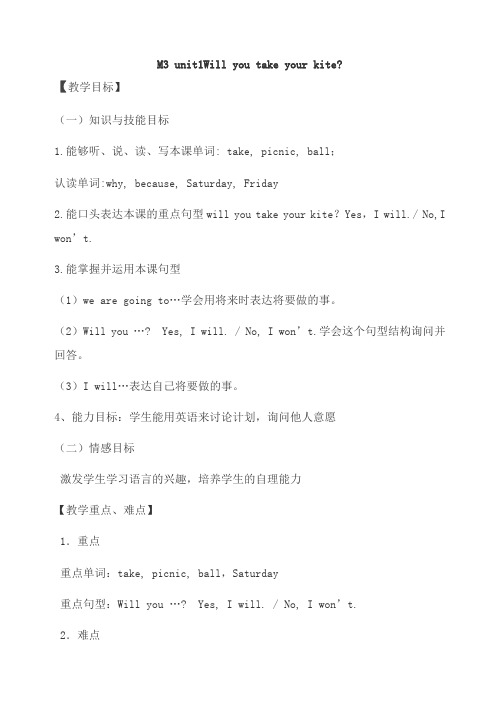
M3 unit1Will you take your kite?【教学目标】(一)知识与技能目标1.能够听、说、读、写本课单词: take, picnic, ball;认读单词:why, because, Saturday, Friday2.能口头表达本课的重点句型will you take your kite?Yes,I will./ No,I won’t.3.能掌握并运用本课句型(1)we are going to…学会用将来时表达将要做的事。
(2)Will you …? Yes, I will. / No, I won’t.学会这个句型结构询问并回答。
(3)I will…表达自己将要做的事。
4、能力目标:学生能用英语来讨论计划,询问他人意愿(二)情感目标激发学生学习语言的兴趣,培养学生的自理能力【教学重点、难点】1.重点重点单词:take, picnic, ball,Saturday重点句型:Will you …? Yes, I will. / No, I won’t.2.难点运用将来时态表达自己将要做的事情【教法学法】1、情境教学法:创设情景,启发学生触景生情、有感而发、由景生言。
2、游戏法:创设游戏,让学生能够在游戏中学习,寓教于乐。
活跃课堂气氛。
3、任务型教学法:引导学生思考,积极完成任务。
培养学生的自主性和创新意识。
【教学准备】图片、课件、磁带【教学设计】:一、唱歌热身,轻松进入英语课堂。
1、通过与学生问候,交流引出flash歌曲:《Row,Row,Row your boat》。
2教学生边做动作边唱,伸出手臂做出流水的波纹状,(这个活动贴近学生生活,学生比较喜欢,固然参与热情高,另外,欢快的歌曲能使学生精神放松,近而调整学生情绪,减轻学生学习焦虑,更重要的是引I like rowing,on Saturday we will have a picnic,引出 I w ill句型。
为下一步的教学导入奠定了基础。
英语外研新标准(三起)四年级下册- Module 4 Unit 1 Will you take yo

英语外研新标准(三起)四年级下册- Module 4 Unit 1 Willyou take your kite教案教学目标1.了解问询他人是否有做某事的用语:“Will you take…?”2.听、说、读、写句型:“Will you take your kite?”3.学生能够在实际生活中运用所学知识询问他人是否准备带上某物。
教学重点1.学会用“Will you take…?”来询问他人是否准备带上某物。
2.阅读、写作技能的培养。
教学难点1.学生能否熟练运用所学知识询问他人。
2.较为复杂的阅读技能的培养。
教学准备1.多媒体课件。
2.板书工具。
教学过程导入(5分钟)1.教师与学生互相问好,营造良好的课堂氛围。
2.教师为学生介绍本节课的主要内容。
热身(10分钟)1.教师向学生展示一个名为“Flying Kite”的视频短片,并问学生是否喜欢放风筝。
2.向学生讲述自己童年时放风筝的有趣经历,并要求学生与教师分享自己的风筝故事和经历。
正文(25分钟)1. 学习会话1.向学生展示“Will you take your kite?”这个句子的用法和意义,并要求学生用此句子询问自己的同桌是否准备带风筝。
2.让学生进行互动交流,帮助他们更好地掌握询问方式。
2. 阅读理解1.教师出示一张名为“Famous Kites”的图片,并引导学生进行阅读。
2.教师向学生提出一些问题,帮助学生更深入、更全面地理解文章。
3. 巩固练习1.让学生以小组为单位进行练习,询问对方是否准备带上指定的物品。
2.鼓励学生进行课堂展示,并向同班同学询问是否准备带上指定的物品。
小结(5分钟)1.教师总结本节课上学习的重点内容。
2.向学生提出一些问题,帮助他们回顾本节课的重要信息。
课堂作业(5分钟)让学生在家将“Will you take your kite?”这个句子运用到实际生活中,询问他人是否准备带风筝或其他物品。
总结在本节课中,学生通过学习“Will you take…?”这一句型,掌握了询问他人是否准备带上某物的方法。
(外研社版三年级起第四册)-Module-3-Unit-1-Will-you-take-your-kite.-教学设计

(外研社版三年级起第四册) Module 4 Unit 1 Will you take your kite?.一、教材分析本单元是以Picnic为题的对话,要求学生会用Will you …? Will you take…? 和Will you take…to…? 以及回答Yes, I will. No, I won’t.来制定并谈论计划。
前面学生已经接触过一般将来时态以及be going to句型。
本模块学习起来相对简单一些,但学生必须通过大量的操练才能熟练的掌握。
二.教学目标:知识目标:学习功能问句Will you take your kite to the picnic tomorrow ? Will you take your ball tomorrow? No, I won’t.新授单词:take, tomorrow, why(not)。
技能目标:能够听懂会说本模块句型,能灵活运用功能句谈论将来的行为。
情感目标:在积极参与教学活动及小组合作中中体会到学习的快乐。
运用目标:运用所复习工具的Will you...?结构,询问小组同学,周六全班野餐将带什么东西。
2.教学重、难点:灵活运用Will you take…? 和Will you take…to…? 以及回答Yes, Iwill. No, I won’t.来谈论计划。
三、学情分析本模块内容适合四年级学生,他们经过一年的学习初步具备一定的听说读的技能,有较好的模仿能力,在老师的引导下,能运用所学基本句型进行语言操练,在课堂教学中能积极参与,互动交流。
并且一般将来时态前面已经学习接触过,学习起来难度会降低一些。
本课运用will 对对方将来要做的事情进行提问,对于大多数学生来说比较容易掌握。
但是,要灵活自如地运用重点句型进行语言交流、制定计划,还需要大量的操练。
四.教学方法:五步教学法,小组合作学习五、教具:课件、CD-ROM六、教学过程Step 1 Review1. Sing a chant2. Lead-inT: Just now Amy can fly a kite, and I can fly a kite too. Will you fly a kite ? Will you fly?T: But the birds will fly,look at this picture. These are birds and cats. Let’s look and listen “what will they do?”Step 2 Presentation1. Listen first and choose the right answer.They’re going to have a ______.A. partyB. picnic(教读并板书picnic)2. Listen again and answer the question” what will Sam ask?”【设计意图】本环节主要是帮助学生理解对话大意,呈现重点知识。
(外研社版三年级起第四册)_Mo...
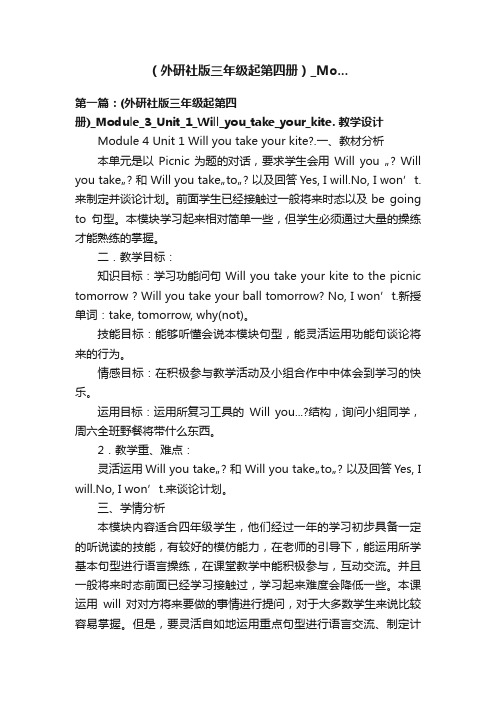
(外研社版三年级起第四册)_Mo...第一篇:(外研社版三年级起第四册)_Module_3_Unit_1_Will_you_take_your_kite. 教学设计Module 4 Unit 1 Will you take your kite?.一、教材分析本单元是以Picnic为题的对话,要求学生会用Will you …? Will you take…? 和Will you take…to…? 以及回答Yes, I will.No, I won’t.来制定并谈论计划。
前面学生已经接触过一般将来时态以及be going to句型。
本模块学习起来相对简单一些,但学生必须通过大量的操练才能熟练的掌握。
二.教学目标:知识目标:学习功能问句 Will you take your kite to the picnic tomorrow ? Will you take your ball tomorrow? No, I won’t.新授单词:take, tomorrow, why(not)。
技能目标:能够听懂会说本模块句型,能灵活运用功能句谈论将来的行为。
情感目标:在积极参与教学活动及小组合作中中体会到学习的快乐。
运用目标:运用所复习工具的Will you...?结构,询问小组同学,周六全班野餐将带什么东西。
2.教学重、难点:灵活运用Will you take…? 和Will you take…to…? 以及回答Yes, I will.No, I won’t.来谈论计划。
三、学情分析本模块内容适合四年级学生,他们经过一年的学习初步具备一定的听说读的技能,有较好的模仿能力,在老师的引导下,能运用所学基本句型进行语言操练,在课堂教学中能积极参与,互动交流。
并且一般将来时态前面已经学习接触过,学习起来难度会降低一些。
本课运用will 对对方将来要做的事情进行提问,对于大多数学生来说比较容易掌握。
但是,要灵活自如地运用重点句型进行语言交流、制定计划,还需要大量的操练。
2023年外研版(三年级起点)四年级下册Module4 Unit1 Will you take yo
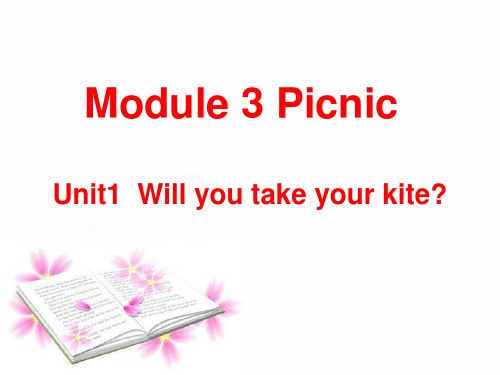
Read the new words.
picnic ball great take why so because
Friday Saturday
Bang game(爆炸游戏)
(读单词,遇到红色单词不读)
picnic ball great take
why so because Friday Saturday
事么
。旅
。行
,
身
体
和
灵
魂
总
要
我们,还在路上……
Hale Waihona Puke applesListen to the tape, underline the new words.(听录音,划出新单词)
great 太好了 why 为什么 because 因为 so 所以
星期一 星期二 星期三 星期四 星期五 星期六 星期日
Monday Tuesday Wednesday Thursday Friday Saturday Sunday
N0,I won’t. No, I won’t.
sweets
ball
biscuits
kite
bread
rice
Will you take your …? Yes,I will.
No,I won’t.
Test根据汉意填单词
1.They are going to have a___(野餐)
2.Will you ___(带走)your kite? 3.Will Sam take his ___(球)?
---____. A.Great B.Thank you C.No 2.I will ___ my kite tomorrow. A.takes B.taking C.take 3.We’re going to have a party ___Saturday. A.at B.on C.in 4.---Why? ---___she is young. A.So B.Because C.And
新标准英语三年级起点第四册《Will you take your kite》教学设计
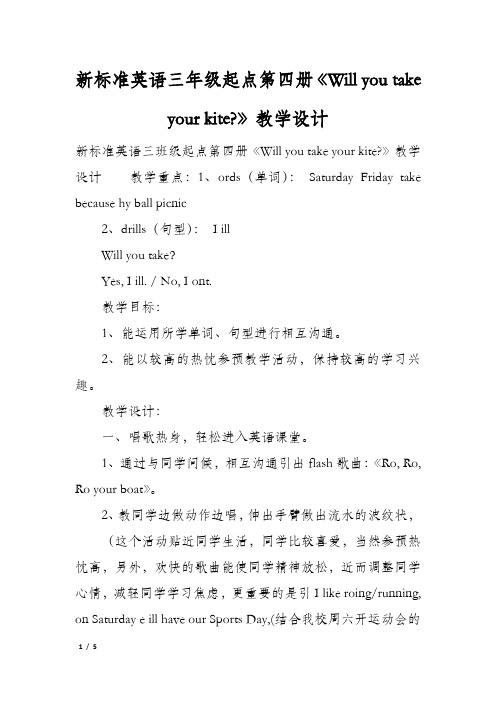
新标准英语三年级起点第四册《Will you takeyour kite?》教学设计新标准英语三班级起点第四册《Will you take your kite?》教学设计教学重点:1、ords(单词):Saturday Friday take because hy ball picnic2、drills(句型):I illWill you take?Yes, I ill. / No, I ont.教学目标:1、能运用所学单词、句型进行相互沟通。
2、能以较高的热忱参预教学活动,保持较高的学习兴趣。
教学设计:一、唱歌热身,轻松进入英语课堂。
1、通过与同学问候,相互沟通引出flash歌曲:《Ro, Ro, Ro your boat》。
2、教同学边做动作边唱,伸出手臂做出流水的波纹状,(这个活动贴近同学生活,同学比较喜爱,当然参预热忱高,另外,欢快的歌曲能使同学精神放松,近而调整同学心情,减轻同学学习焦虑,更重要的是引I like roing/running, on Saturday e ill have our Sports Day,(结合我校周六开运动会的背景)引出I ill句型。
为下一步的教学导入奠定了基础。
)二、导入、呈现学习新语言材料。
1、Saturday,Friday:通过过渡语由上一环节自然过渡到这一环节:Just no, eve sung the song 《Ro, Ro, Ro your boat》do you like roing a boat?(刚才我们一起演唱了歌曲《Ro, Ro, Ro your boat》,你们喜爱划船吗?)通过师生谈论like roing a boat,师随即说出I also like running, and e kno that e ill have our Sports Day, do you kno hen? 引出新单词Saturday接着用单词卡学习这一词顺当切入本课内容,。
新标准英语(三年级起点)第四册Module 3 Unit 1教案
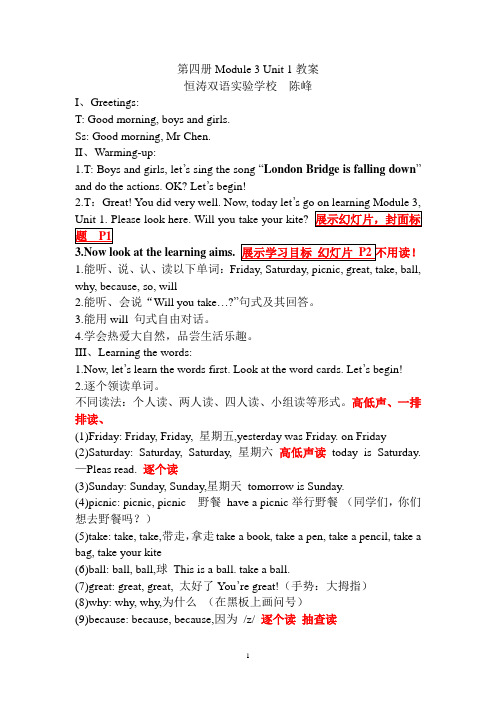
第四册Module 3 Unit 1教案恒涛双语实验学校陈峰I、Greetings:T: Good morning, boys and girls.Ss: Good morning, Mr Chen.II、Warming-up:1.T: Boys and girls, let’s sing the song “London Bridge is falling down”and do the actions. OK? Let’s begin!2.T:Great! Y ou did very well. Now, today let’3.Now look at the learning aims.1.能听、说、认、读以下单词:Friday, Saturday, picnic, great, take, ball, why, because, so, will2.能听、会说“Will you take…?”句式及其回答。
3.能用will 句式自由对话。
4.学会热爱大自然,品尝生活乐趣。
III、Learning the words:1.Now, let’s learn the words first. Look at the word cards. Let’s begin!2.逐个领读单词。
不同读法:个人读、两人读、四人读、小组读等形式。
高低声、一排排读、(1)Friday: Friday, Friday, 星期五,yesterday was Friday. on Friday(2)Saturday: Saturday, Saturday,星期六高低声读today is Saturday. —Pleas read. 逐个读(3)Sunday: Sunday, Sunday,星期天tomorrow is Sunday.(4)picnic: picnic, picnic 野餐have a picnic举行野餐(同学们,你们想去野餐吗?)(5)take: take, take,带走,拿走take a book, take a pen, take a pencil, take a bag, take your kite(6)ball: ball, ball,球This is a ball. take a ball.(7)great: great, great, 太好了Y ou’re great!(手势:大拇指)(8)why: why, why,为什么(在黑板上画问号)(9)because: because, because,因为/z/ 逐个读抽查读(10)so: so, so,所以(11)will: will, will, 将要at the words. Read and recite. Let’s4.Now stand up and recite the words.(站起来,看着汉语意思,说出单词。
小学英语三起点第四册Module3_Will_you_take_your_kite

√
B. Because tomorrow is Friday.
:We’re going to have a
picnic tomorrow.
:Yes, I will. Will you take some biscuits, Meiyangyang?
:Great!
:No, I won’t. I will take my doll.
: Will you take a kite,
Xiyangyang?
:Will you take some biscuits, Lanyangyang?
:Yes, I will. Will you take a ball?
:No, I won’t.
I will take some cakes.
--We ’re going to go to … Will you take your…?
Let’s say a chant:
Saturday Picnic Saturday picnic on Saturday have a picnic
We’re going to have a picnic on Saturday.
Picnic
have a picnic
a cap
I will take
Read and choose.
They’re going to have a picnic on____. A. Friday
√
B. Saturday
Listen and circle Yes or No.
1.Amy will take her ball on Friday. Yes No
2.Sam thinks(认为) tomorrow is Saturday. Yes No
新标准英语三年级起点第四册全册教案.docx
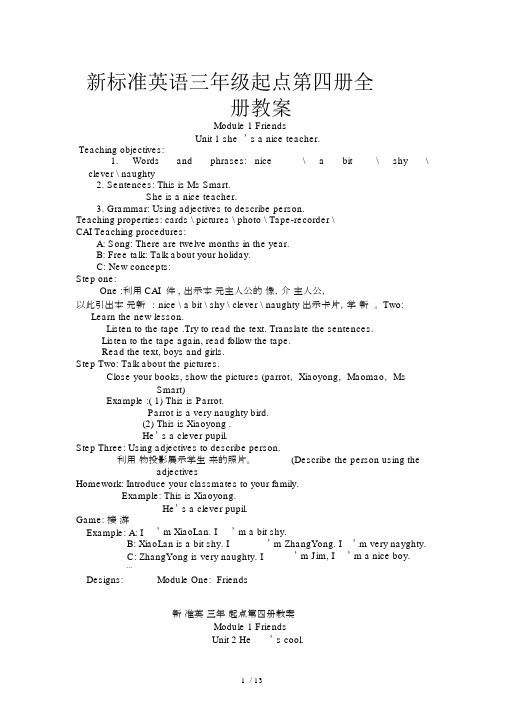
新标准英语三年级起点第四册全册教案Module 1 FriendsUnit 1 she ’ s a nice teacher.Teaching objectives:1.Words and phrases: nice\a bit\shy\clever \ naughty2. Sentences: This is Ms Smart.She is a nice teacher.3. Grammar: Using adjectives to describe person.Teaching properties: cards \ pictures \ photo \ Tape-recorder \CAI Teaching procedures:A:Song: There are twelve months in the year.B:Free talk: Talk about your holiday.C:New concepts:Step one:One :利用 CAI 件 , 出示本元主人公的像,介主人公,以此引出本元新: nice \ a bit \ shy \ clever \ naughty 出示卡片,学新。
Two: Learn the new lesson.Listen to the tape .Try to read the text. Translate the sentences.Listen to the tape again, read follow the tape.Read the text, boys and girls.Step Two: Talk about the pictures.Close your books, show the pictures (parrot, Xiaoyong, Maomao, MsSmart)Example :( 1) This is Parrot.Parrot is a very naughty bird.(2) This is Xiaoyong .He’ s a clever pupil.Step Three: Using adjectives to describe person.利用物投影展示学生来的照片。
【英语教案】小学英语第四册Module3教案(新版新标准)
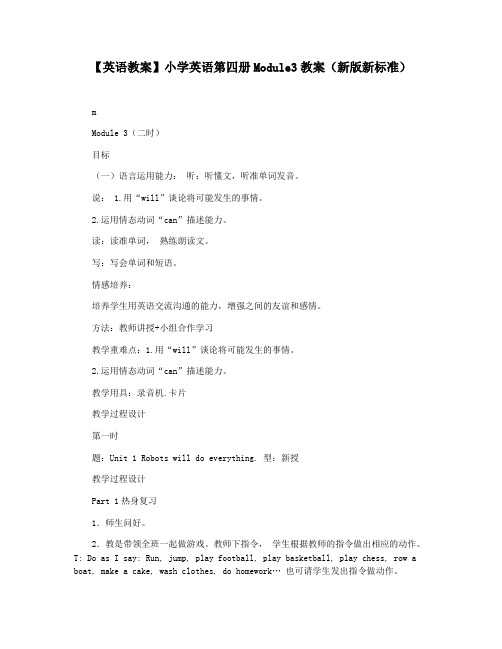
【英语教案】小学英语第四册Module3教案(新版新标准)mModule 3(二时)目标(一)语言运用能力:听:听懂文,听准单词发音。
说: 1.用“will”谈论将可能发生的事情。
2.运用情态动词“can”描述能力。
读:读准单词,熟练朗读文。
写:写会单词和短语。
情感培养:培养学生用英语交流沟通的能力,增强之间的友谊和感情。
方法:教师讲授+小组合作学习教学重难点:1.用“will”谈论将可能发生的事情。
2.运用情态动词“can”描述能力。
教学用具:录音机.卡片教学过程设计第一时题:Unit 1 Robots will do everything. 型:新授教学过程设计Part 1热身复习1.师生问好。
2.教是带领全班一起做游戏。
教师下指令,学生根据教师的指令做出相应的动作。
T: Do as I say: Run, jump, play football, play basketball, play chess, row a boat, make a cake, wash clothes, do homework… 也可请学生发出指令做动作。
Part 2 任务呈现与文导入1.学习韵律诗,学生跟着说。
练习用can描述能力。
2.导入新。
教师假装很累,擦擦汗,对学生说:I’m very tired. Who can help us? Can the robot help us? 引出文内容。
Part 3文教学。
1.教师对机器人进行简单描述。
2.放录音,同时用笔勾出生词和词组。
3.再放录音。
学生认真听。
并找出问题的答案。
What can Daming’s Robot do? Will robots do the housework?Will robots help children learn? Will robots do homework for children?用图片及卡片学习robot will everything one day housework learn our 等单词4、解学生疑问和问题的答案。
